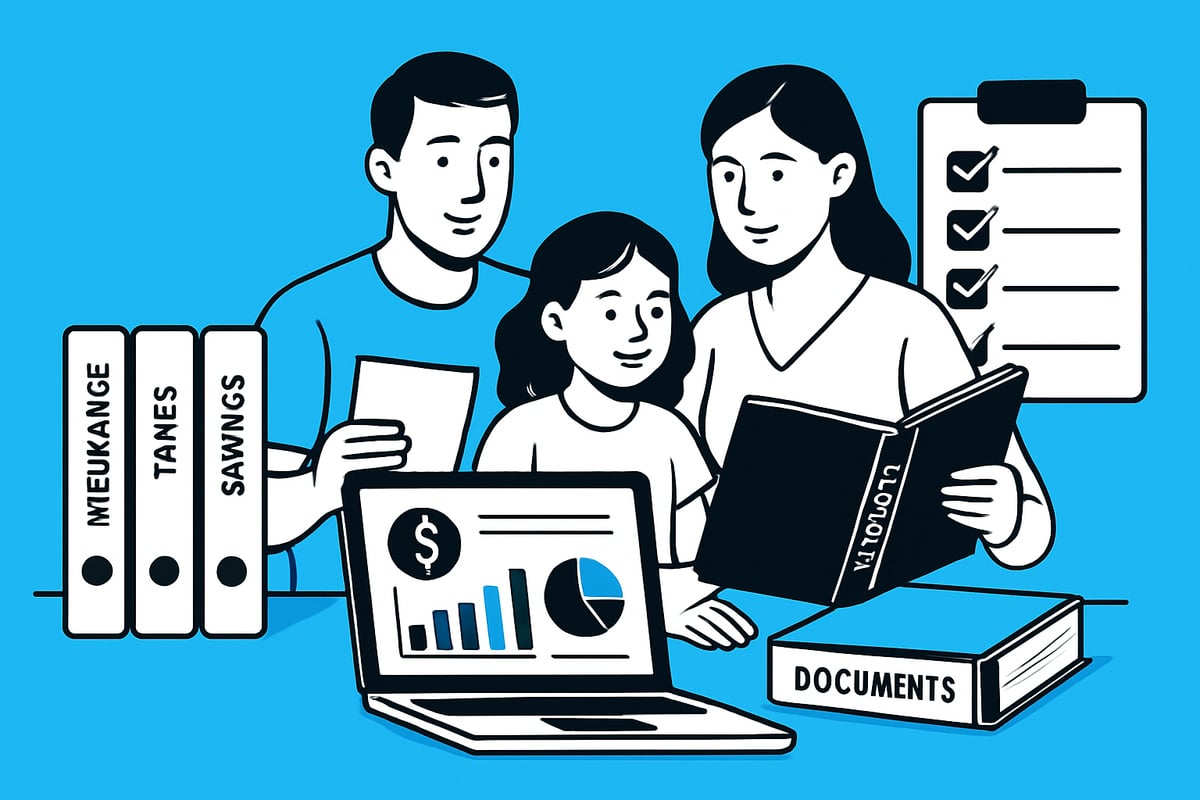In 2025, the ability to manage finances has never been more important or more complex. Rapid changes in technology, shifting economic trends, and new financial tools demand a smarter approach.
This article uncovers nine proven ways to take charge of your financial future. You will learn how to budget with accuracy, use powerful apps, tackle debt, grow your savings, and protect what matters most.
Ready to adapt and succeed in this changing landscape? Dive in to discover practical strategies that can help you manage finances with confidence and clarity.
The Evolving Landscape of Personal Finance in 2025
Navigating how to manage finances in 2025 means facing a world transformed by technology, shifting economic forces, and new consumer expectations. The way people interact with money is changing at lightning speed, making adaptability and awareness more important than ever.

The rise of digital banking is one of the most striking shifts this year. More consumers are moving away from brick-and-mortar banks, choosing online platforms that offer convenience, speed, and enhanced features. AI-driven financial tools are now mainstream, helping users manage finances by automatically categorizing expenses, forecasting cash flow, and even suggesting savings strategies.
Inflation and interest rates remain top concerns, as global events continue to ripple through local economies. High inflation impacts purchasing power, while fluctuating interest rates affect everything from mortgages to savings yields. Staying informed and agile is critical for anyone wanting to manage finances effectively amid these changes.
Fintech apps and automation have taken center stage in daily money management. Innovative platforms allow users to track spending, automate bill payments, and invest with just a few taps. In fact, according to personal finance app market growth, digital wallet usage increased by 25% in 2024, and experts predict even greater adoption in 2025. This surge in technology means more opportunities to manage finances proactively, but it also requires a higher level of financial literacy.
The shift to cashless transactions is accelerating, with digital wallets and contactless payments becoming the norm. However, this convenience comes with new challenges. Rising costs of living, cybersecurity threats, and market volatility require smarter strategies and heightened vigilance. On the flip side, there are real opportunities: high-yield savings accounts, wider access to investments, and smarter budgeting tools can all help individuals manage finances with greater effectiveness.
Here’s a quick comparison of challenges and opportunities in 2025:
| Challenges | Opportunities |
|---|---|
| Rising cost of living | Higher-yield savings accounts |
| Cybersecurity threats | Investment access via fintech |
| Market volatility | Automated budgeting tools |
As 2025 unfolds, those who commit to learning, using new tools, and staying organized will be best positioned to manage finances successfully. The landscape is evolving, but with the right approach, you can turn today’s challenges into long-term financial wins.
9 Smart Ways to Manage Finances Effectively in 2025
Are you ready to manage finances with more confidence and clarity in 2025? As the financial landscape evolves, so do the tools and strategies available to you. From automation to ongoing education, these nine smart ways will help you manage finances efficiently, meet your goals, and stay ahead of the curve. For even more actionable tips, check out how to manage your finances for practical guidance.

1. Embrace Automated Budgeting Tools
Automated budgeting tools are transforming the way people manage finances. With the rise of AI-driven apps, categorizing expenses and forecasting future spending is faster and more accurate than ever. Leading apps like YNAB and Mint use smart algorithms to track every dollar, helping you spot patterns and stay on top of bills.
Why is automation so powerful? It saves time, reduces the risk of human error, and ensures you never miss a payment. Imagine getting real-time alerts when you approach a spending limit or a bill is due. You can also customize reports, making it easier to understand where your money goes.
Did you know that automated tools helped reduce overspending by 18% on average in 2024 (Capital One)? That’s a significant improvement for anyone looking to manage finances with precision.
Security matters, too. Always review privacy settings and enable two-factor authentication to keep your data safe. With user numbers growing by 30% in 2024, now is the perfect time to let automation work for you.
2. Set Clear, Measurable Financial Goals
You can’t manage finances effectively without clear goals. Setting both short-term and long-term targets gives you direction and motivation. Use the SMART framework: Specific, Measurable, Achievable, Relevant, and Time-bound.
For example, if you want a $10,000 emergency fund, break it into monthly savings targets. Track progress using visual tools like goal-tracking apps or spreadsheets. Seeing your progress builds momentum.
Align your goals with life events, such as buying a home or preparing for a family. Adjust your targets as circumstances change. When you manage finances with intention, you’re less likely to drift off course.
Accountability is key. Share your goals with a partner or friend, and schedule regular check-ins. This keeps you motivated and helps you celebrate milestones along the way.
3. Prioritize Debt Reduction Strategically
To manage finances well, you need a clear plan for tackling debt. Start by listing all your debts, separating high-interest from low-interest balances. Choose a payoff strategy: the avalanche method (highest interest first) saves you more on interest, while the snowball method (smallest balance first) offers quick wins.
Consider consolidating or refinancing loans to secure lower rates. Automate payments to avoid late fees and boost your credit score. In 2025, refinancing student loans can be a smart move if new rates are lower.
According to the Federal Reserve, the average household credit card debt rose 7% in 2024. By managing finances and focusing on debt reduction, you can free up cash flow for savings and investments.
Improved credit and more disposable income are just a few benefits. Commit to reviewing your debt strategy annually, and adjust as your situation changes.
4. Maximize Savings with High-Yield Accounts
Managing finances isn’t just about spending—it’s also about saving smart. Online banks and high-yield savings accounts have become more popular in 2025, offering higher interest rates and fewer fees than traditional banks.
Compare account features like APY, transfer ease, and fee structures. For example, switching from a 0.5% to a 4% APY account can supercharge your savings. According to Capital One, online banks typically offer 3-4 times higher rates.
Use high-yield accounts for your emergency fund and sinking funds for planned expenses. Automate transfers so you consistently save without thinking about it. Always check for FDIC insurance and robust security features before opening an account.
Managing finances with the right account can help your money grow faster and provide peace of mind.
5. Leverage Technology for Smarter Money Management
Technology is a game-changer when you manage finances in 2025. Fintech apps now offer AI-powered advisors, robo-investing, and detailed spending analytics. By integrating all your accounts, you get a complete picture of your financial health.
Mobile apps make bill payments, transfers, and notifications seamless. AI-driven tools can even recommend personalized savings strategies based on your habits. Did you know that 65% of Americans use at least one fintech app for money management in 2024?
Security is essential. Enable multi-factor authentication and keep your apps updated. As features evolve, stay informed about new tools that can make managing finances easier and more effective.
6. Track and Optimize Your Spending Habits
The first step to manage finances better is understanding how you spend. Regularly review your spending, whether monthly or quarterly. Categorize your expenses to find leaks, such as unused subscriptions or impulse buys.
Set spending limits for each category, and use tools like spending trackers, bank analytics, or spreadsheets. For example, canceling unused subscriptions could save you $100 per month.
Households that track spending save 15% more annually (SBA, 2024). Adjust your habits to match your financial goals, and don’t be afraid to make small changes for big results.
Keep your process simple and consistent. The more you know about your spending, the easier it is to manage finances wisely.
7. Diversify and Automate Investments
To manage finances for long-term growth, diversify your investments. Spread your money across stocks, bonds, ETFs, and real estate to reduce risk. Robo-advisors and automatic investing tools make it easier than ever in 2025.
Set up recurring investments for dollar-cost averaging. For example, automate $200 monthly into a diversified ETF portfolio. Automated investing accounts grew by 40% in 2024, showing growing trust in these tools.
Review your portfolio annually and rebalance as needed. Use risk management strategies to protect your gains, especially in volatile markets. Diversification is your best defense against uncertainty when you manage finances.
8. Protect Yourself Against Financial Risks
Managing finances isn’t only about building wealth—it’s also about protecting it. Make sure you have the right insurance: health, life, disability, and property coverage. Review your policies annually and update them as your needs change.
With digital threats on the rise, consider adding cyber insurance and building a robust identity theft protection plan. In 2024, financial fraud losses increased by 22% (FTC).
Keep emergency funds as a safety net for job loss or medical emergencies. Secure your online accounts with strong passwords and regular monitoring. Taking these steps ensures you can manage finances confidently, even during unexpected events.
9. Commit to Ongoing Financial Education
The most successful people manage finances by always learning. Stay current on tax laws, investment trends, and new financial tools. Use free resources like online courses, podcasts, and financial blogs.
Consult with advisors for complex decisions. Attend virtual seminars—like a retirement planning workshop—to deepen your knowledge. The SBA found that financially literate individuals are twice as likely to achieve their goals in 2024.
Make education a habit. Schedule monthly financial check-ins, involve your family, and celebrate your progress. The more you know, the better you can manage finances in any economy.
Integrating Financial Organization Systems for Lasting Success
In today’s fast-paced world, the ability to manage finances effectively depends on how organized you are. Without a reliable system, it’s easy to lose track of accounts, miss important deadlines, or scramble during emergencies. Financial organization is the backbone that supports every other aspect of your money management journey.

Why Organization Matters
When you manage finances with a clear structure, you gain visibility and control over your entire financial picture. Keeping accounts, insurance policies, investment documents, and estate plans organized minimizes stress and helps you make smarter decisions. Over 60% of families struggle to locate key documents when it matters most, causing unnecessary delays and anxiety.
Choosing Digital or Physical Systems
There are many ways to manage finances, but the system you choose should match your lifestyle. Digital solutions like cloud storage, spreadsheets, and secure apps make it easy to update and access information from anywhere. Physical options, such as filing cabinets or dedicated binders, offer a tangible way to track paperwork. Many people combine both for maximum security and convenience.
Financial Planning Binders and Digital Planners
A comprehensive tool like a financial planning binder can transform the way you manage finances. By centralizing account info, insurance details, estate documents, and emergency contacts, you streamline access and reduce chaos. For a deeper dive, explore these Financial planning binder strategies, which show how a well-structured binder empowers you to take control. Many families now keep a single, organized resource everyone can access if needed.
Keeping Information Current and Accessible
To manage finances smoothly, update your records regularly and share access with a trusted partner or family member. This ensures someone can step in during emergencies or transitions. Digital tools often allow secure sharing, while physical binders should be stored in a safe yet reachable location. Regular reviews help you catch outdated info—like expired IDs or lapsed insurance—before they become problems.
Actionable Steps to Get Organized
Ready to manage finances more efficiently? Start with a checklist of essential documents and accounts. Digitize important papers and back them up securely. Set a schedule—monthly or quarterly—to review and update your information. Streamline annual tasks like tax prep by using organization systems that work for you. For tips on simplifying yearly reviews, check out this guide to simplifying taxes and financial reviews. Taking these steps will give you peace of mind and help protect your financial future.
The Impact of Mindset and Habits on Financial Wellbeing
Your mindset shapes the way you manage finances, influencing every decision from daily spending to long-term planning. In 2025, adopting a proactive attitude is essential, as the financial landscape keeps shifting. Research shows that individuals who approach money with a growth mindset are more likely to adapt, learn, and thrive, regardless of external changes. National trends reveal that Americans are placing greater emphasis on conscious financial choices, as highlighted in Americans' financial priorities in 2025. Understanding the psychological side of money can help you break unhelpful patterns and set a strong foundation for success.

The Power of Habits for Financial Success
Small, consistent routines are the backbone of how you manage finances effectively. This approach is called habit stacking—layering simple actions to create powerful results over time. Examples include:
- Setting automatic reminders for bills and investments
- Reviewing spending weekly
- Allocating a set amount to savings every payday
These habits might seem minor, but they add up. In fact, 80% of financially successful people credit their routines and mindset for their achievements. When you manage finances with intention, you reduce stress and build confidence with every positive step.
Overcoming Barriers and Celebrating Progress
Many people struggle to manage finances due to procrastination, fear of numbers, or lack of confidence. The good news is that these barriers can be overcome with structure and self-compassion. Try breaking large tasks into smaller ones, use digital tools for reminders, and celebrate small wins along the way. Remember, progress is more important than perfection. Each time you manage finances with care, you set yourself up for greater stability and peace of mind.
Now that you’ve explored these nine smart ways to manage your finances in 2025, it’s clear that staying organized and having everything in one place is a real game changer. Imagine never scrambling for account numbers or insurance details during stressful moments—you’ll always know where things are, and so will your loved ones. If you want to bring all your financial and personal info together in an easy, secure way, I highly recommend checking out The Family Binder. You can get started right away—just Download Now and set yourself up for peace of mind.

